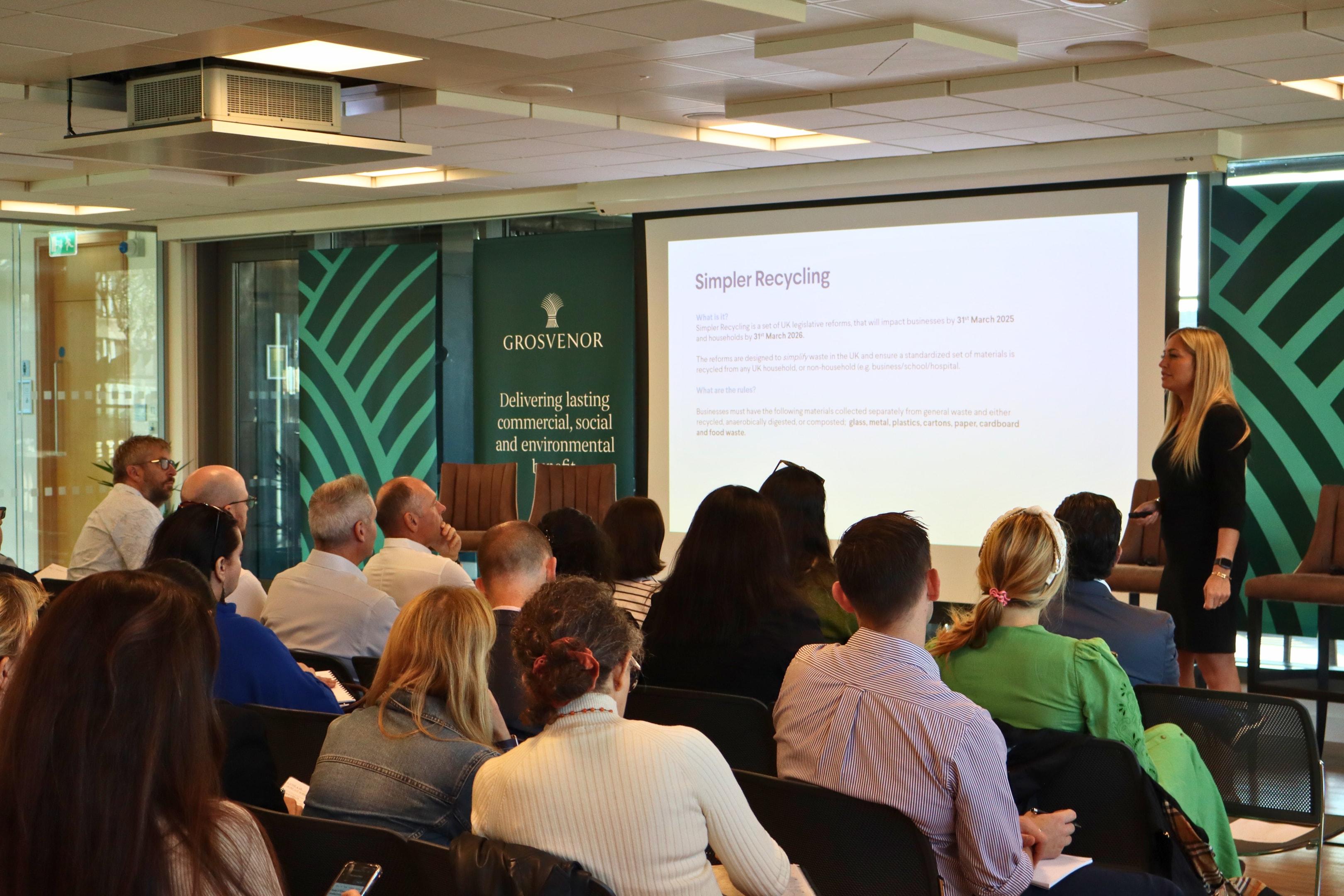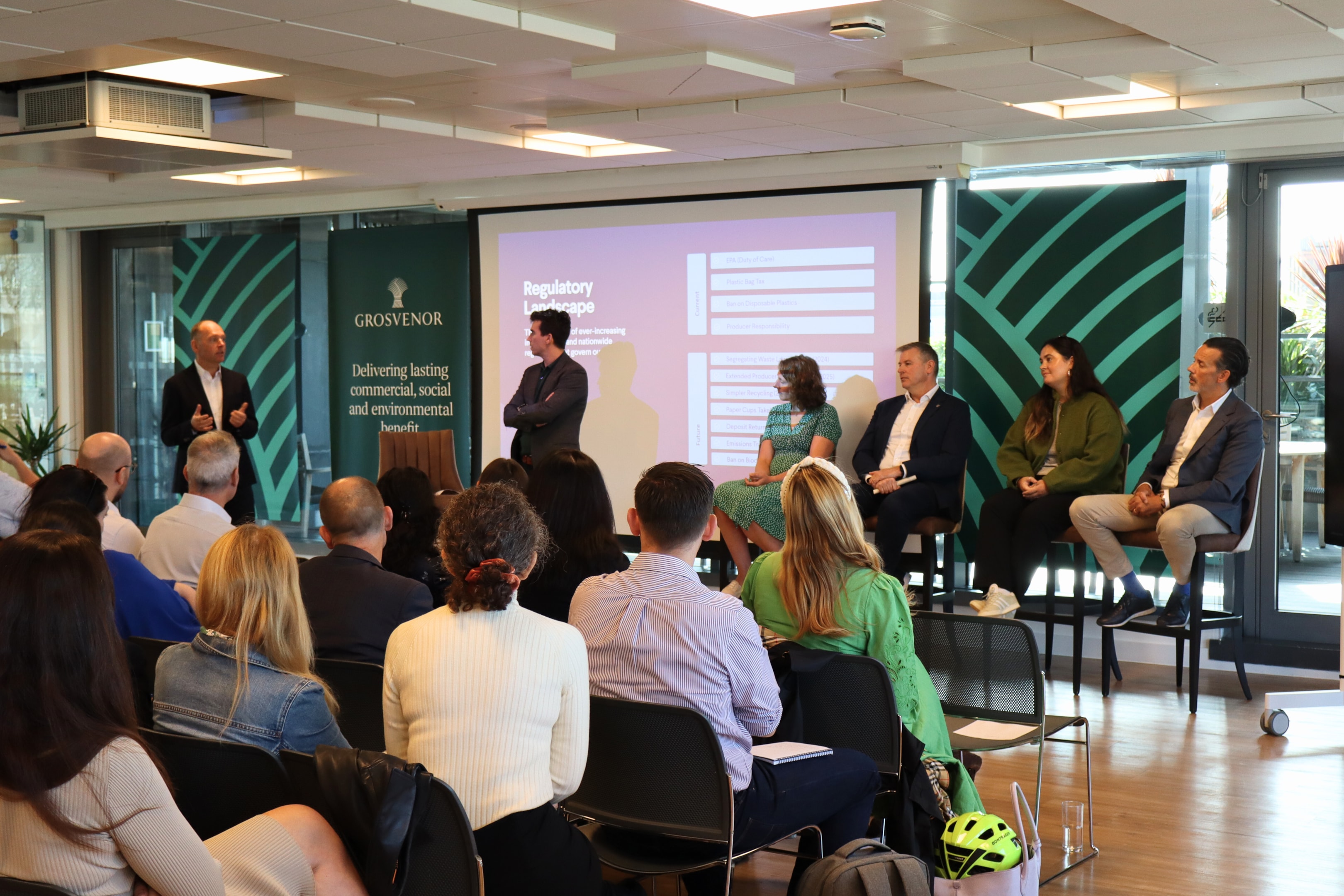Are you one of the 36% of businesses prepared for the upcoming Simpler Recycling reforms?
Join us as we recap our recent event at Grosvenor, “The Future of Waste,” where we delved into the latest recycling legislation and its implications for businesses.
The free event brought together members of the public, customers, industry leaders as well as a panel of experts from Lush Cosmetics, Royal Opera House, Caffé Nero and ATG Group to discuss how they’re preparing for the Simpler Recycling reforms and provide actionable insights.
With just six months until the March 31, 2025 deadline, businesses must understand these changes to ensure compliance and long-term success.
What is Simpler Recycling?

Simpler Recycling is a new set of regulations designed to make recycling easier and more consistent across the UK.
Businesses must have the following materials collected separately from general waste and either recycled, anaerobically digested, or composted; glass, metal, plastics, cartons, paper, cardboard and food waste.
To put it simply. Simpler Recycling Compliance =
-
Use Mixed Recycling and/or Single Stream Recycling to recycle
-
Use Food Recycling to recycle food waste
-
Use General Waste for anything else, to ensure your recycling streams are not contaminated.

The goal? To ensure a standardised set of materials are recycled from businesses by March 31st 2025. The guidelines will also include the recycling of plastic film packaging to enhance recycling efficiency.
Implementation and Guidance
The implementation of Simpler Recycling will be phased to ensure a smooth transition:
-
Non-Household Municipal Premises: These premises must comply by 31 March 2025.
-
Micro-Businesses: Micro-businesses with fewer than 10 employees have until 31 March 2027 to comply.
The government will provide statutory guidance on the duties imposed by the Simpler Recycling legislation, and local authorities will be tasked with offering more consistent recycling and waste collection services.
What does Simpler Recycling mean for businesses?
Simpler Recycling compliance for businesses is:
By March 31, 2025, your business will need to have separate collections for the following recyclable waste materials:
These materials must be collected separately from your general waste bin. You can choose from a few different recycling methods to comply:
-
Mixed Recycling: Combine glass, metal, plastics, cartons, paper and cardboard into a single bin.
-
Single Stream Recycling: Separate a specific recyclable stream (e.g. plastics) for even higher recycling quality.
-
Food Recycling: Collect food waste in a separate bin.
Confused? Don’t worry!
At First Mile, we’re here to help. At our latest event “The Future of Waste”, we discussed the upcoming Simpler Recycling reforms and gave attendees clear actionable advice on how businesses can get ahead.

What are the key Simpler Recycling takeaways from our 'Future of Waste' event?
-
The importance of understanding Simpler Recycling: The reforms will have a significant impact on businesses, so it’s crucial to be aware of the requirements.
-
The need for a plan: Businesses that have a plan in place are more likely to be compliant with the reforms. Planning for the collection of food and garden waste is essential to meet the new regulations.
-
The benefits of working with a waste management provider: A provider like First Mile can help businesses navigate the complexities of recycling and ensure compliance.

How to Prepare for Simpler Recycling
Here are some tips from us for preparing your business for the Simpler Recycling reforms:
-
Review your current waste services: Assess your current waste collection and disposal practices to identify any areas where you need to make changes.
-
Develop a waste management plan: Create a plan that outlines how you will comply with the Simpler Recycling reforms. This plan should include details on your food waste collection methods, waste storage, and disposal procedures.
-
Invest in recycling infrastructure: If necessary, invest in new recycling bins, free First Mile recycling signage, and other infrastructure to support your recycling efforts. Proper management of organic waste is crucial for successful recycling programs.
-
Educate your employees: Make sure your employees are aware of the Simpler Recycling reforms and the importance of a weekly food waste collection to help your business comply. We currently have a range of engagement activities available for customers including, workshops, online webinars and more.
Get ahead of the legislation
Legislation around recycling is constantly evolving. By partnering with a waste management provider like First Mile, you can stay up-to-date on the latest changes and ensure your business is always eco-compliant.
Ready to Get Started?
Contact First Mile today for a free quote and waste audit. Our recycling experts will handle everything, ensuring you have a stress-free switch from your current provider and are fully compliant for March 2025.


